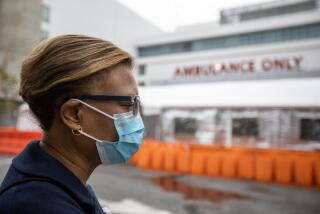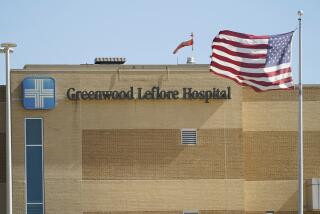Medicare Hospital Fund’s Bankruptcy Seen in 10 Years : Health: Trustees blame rising hospital expense and inadequate tax revenues, and they call for immediate action by Congress to control costs.
- Share via
WASHINGTON — Medicare’s hospital trust fund, which helps pay the hospital bills for 34 million Americans, will run out of money in 10 years, far sooner than previously estimated, the trustees of the Social Security system reported Thursday.
The fund’s bankruptcy is anticipated in the year 2002 because of an alarming combination of rising hospital costs and lower-than-expected tax revenues to support the fund, the unexpectedly blunt and pessimistic report said.
The trustees, who estimated only one year ago that the hospital fund would have sufficient money through the year 2005, called on Congress to act immediately to control health care costs.
Congress should repair Medicare with a specific piece of legislation or deal with rising costs through “more comprehensive health care reform” for the whole nation, the report said.
There must be “prompt action to strengthen the financial stability of the trust fund,” the trustees said.
Social Security’s retirement fund is in good shape, solvent until the year 2036, the trustees reported. On the other hand, the disability trust fund, which makes payments to people unable to work because of physical or mental ailments, is projected to run out of money in 1997. But the retirement and disability systems are financed from a single, amply funded pool of taxes, with workers and employers each paying 6.2% of wages up to $55,500.
Money will be shifted from the retirement pool to the disability fund to avoid any disruption in payments, Commissioner Gwendolyn S. King said in an interview.
The financial crisis is limited to the hospital trust fund, called Part A of Medicare. It is financed by a tax of 1.45% on both employers and workers, paid on incomes up to $130,200. It pays hospital bills for 31 million people over the age of 65 and 3 million disabled people of all ages.
A patient pays $652 for the first day in the hospital, and Medicare then pays for the next 59 days of care. After 60 days, the patient pays $163 daily.
The impending financial crisis does not affect Part B of Medicare, which helps pay doctor bills. This program is funded by monthly premiums from beneficiaries and sufficient general tax revenues to avoid any deficit.
Despite extensive efforts to control costs, Medicare’s hospital fund faces expenses climbing much faster than the general rate of inflation. Hospital admissions are increasing; payment rates are rising, and there is a surge in the number of disabled people requiring costly treatments in hospitals, the trustees reported. Their prediction of bankruptcy sooner than expected for the Medicare trust fund is likely to fuel the political debate over health care costs.
The hospital insurance fund had an income of $88.8 billion last year and spent $72.6 billion. Because revenues have outpaced expenditures, the reserve at year’s end was $115.2 billion.
Annual spending is growing rapidly and will surpass current income in the year 1996. Then the fund will be operating at a deficit each year, and gradually drawing down its reserves, until it exhausts all of its money in 2002, the report said. About 8 million people a year enrolled in Medicare use the hospital benefit.
Medicare is a universally popular program, and it is politically unthinkable for any President or Congress to allow the system to collapse. But the choices are difficult: Cut the benefits to patients to make the revenues last longer, or raise taxes.
“By any measure,” the Medicare hospital fund “is severely out of financial balance,” the trustees said.
Congress should “take prompt legislative action to control the alarming growth in costs of the Medicare program and to restore the financial integrity by enacting specific program legislation or as part of more comprehensive health care reform,” said the trustees, whose job is to deliver a report each year on the fiscal health of the funds.
The report was prepared by five trustees: two public trustees, Stanford G. Ross and David M. Walker, and three Administration officials, Treasury Secretary Nicholas F. Brady, Labor Secretary Lynn Martin, and Health and Human Services Secretary Louis W. Sullivan.
More to Read
Inside the business of entertainment
The Wide Shot brings you news, analysis and insights on everything from streaming wars to production — and what it all means for the future.
You may occasionally receive promotional content from the Los Angeles Times.








